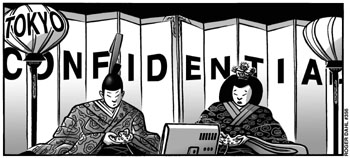
In and around Harbin, Shukan Bunshun talks to Chinese women seeking Japanese husbands, and asks them why. It’s a leap into the unknown. Are they worried? Do they harbor apprehensions?
“I’ve heard living conditions in Japan are good and Japanese men have a sense of responsibility,” says a 22-year-old woman from a farming family. “I have friends and relatives who married Japanese men, so no, I’m not worried.”
“I’m ready for a change,” says a 28-year-old shop clerk who also has friends married to Japanese. “No particular worries. Japanese men are nice — aren’t they?”
Meanwhile, in 2007, the Los Angeles Times noted that “roughly 120 boys are born in China for every 100 girls. Within 15 years, the country may have 30 million men who cannot find wives.”
So why Japan, asks The Japan Times, with China’s own economy surging?
The countryside may be poor, but the cities are booming. Aren’t Chinese cities a more accessible mating ground?
No, says Kenji Doi, a China-based broker of international marriages. “The chances of an ordinary country girl making a rich match for herself in Shanghai or Beijing are very slim. International marriage is still the fastest route to prosperity.”
Earlier this year, former Tokyo reporter Yang Yi, who herself emigrated from Harbin in 1987, was nominated for the prestigious Akutagawa Award for her first novel in Japanese, “Wang-chan.” The novel chronicles the life of a “Chinese woman who moved to Japan as the bride of a Japanese factory worker and then tried to carve out a career as a marriage broker for other Chinese women seeking to marry Japanese men living out in the sticks.” She spoke with Tomoko Otake with The Japan Times Feb. 3:
“I realized that if I was to really make a living out of writing, I would have to be accepted in mainstream Japanese society… So decided to create a story that has both Japanese and Chinese characters. Where would Chinese people interact most with Japanese? Probably if a Chinese gets married to a Japanese. That’s how I came up with this story.”
Your descriptions of an “arranged-marriage tour” — in which a Chinese woman, as a marriage broker, takes Japanese men looking for brides to a Chinese village, are very vivid. Are such situations happening in real life?
“I think they are. Many people told me after I wrote the story, “I didn’t know you were doing that marriage-broker work!” Well, I have never been engaged in such work, so the story is based on my imagination and real-life inquiries from such brides to the newspapers. I don’t know what the situation is really like.”
…Both “Wang-chan” and [earlier work] “Roshojo” feature a Chinese woman living in Japan as a lead character. Do you have any observations on the social position of Chinese women today?
“Yes, that’s exactly why I wrote these novels. The sense of morals and the values that they (the Chinese characters) brought from China are no longer accepted in China. Not only I, but many Chinese women in my generation who came to Japan around the same time as I did, have certain fixed ideas about morals and about how women should behave, but they are shocked at the sense of morals Japanese people have. After living here for a long time, they get used to how Japanese feel. But when they go back to China, they see a Chinese society that has completely changed. The problem is, they haven’t lived the changes themselves. So they are shocked again and feel lost.”
Photo: YOSHIAKI MIURA








